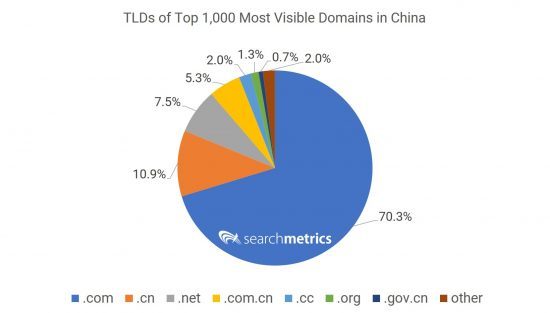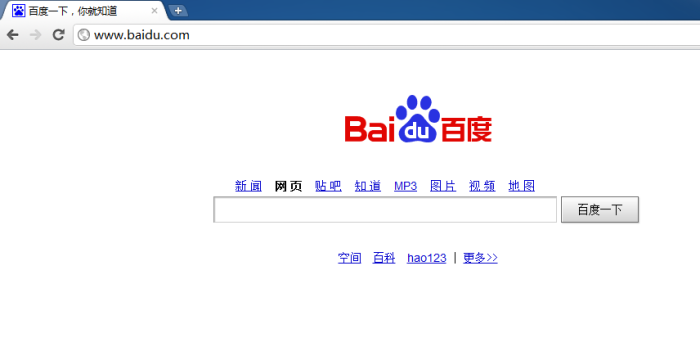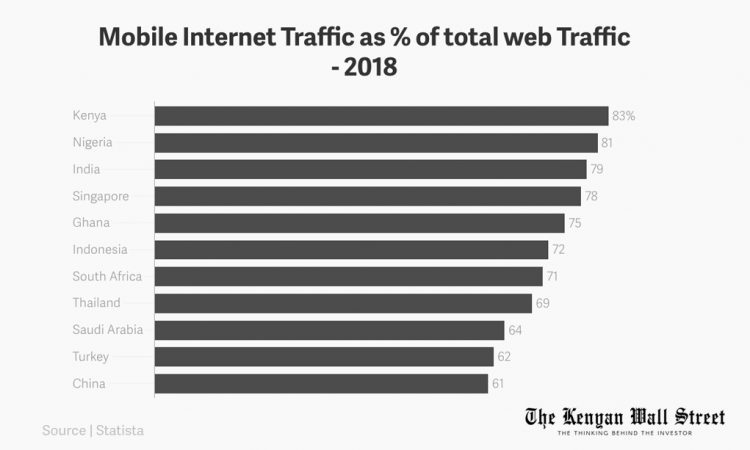In 2018, there are now more than 800 million people in China with internet access. The good news for western marketers is that the expanding middle class in that country likes to shop online and is not afraid to pull out the plastic when a product or service strikes their fancy. The bad news is that you are not going to reach them (in large numbers anyway) with Google.
Google-related SEO will not do you much good in China because the name of the most popular search engine there does not start with a “G.” In China, the go-to search portal with an 80% market share is Baidu.
Doing SEO for a Chinese audience is an entirely different flavor of marketing, largely due to the Great Firewall of China (GFW). For those unfamiliar, "[the] Great Firewall of China (GFW) is the combination of legislative actions and technologies enforced by the People's Republic of China to regulate the Internet domestically."
Here is what you need to know to break into China's market.
Get a .CN or Don’t Bother
Baidu strongly favors the .CN domain suffix (China’s country code) over .com in ranking its search results. Actually, I would suggest not even trying to rank with a .com in China. Your best strategy is to use the same domain prefix you are already using and just buy it as a .CN version. For example, say your main money-making website is HowToPeelAnOrange.com. While I would normally suggest you head over to Namecheap to make the purchase, you will find that it does not offer them. Try GoDaddy, which will set you up with a shiny, new .CN domain for around seven bucks.
Other Baidu-specific tips are to not spread your website out over several domains or create a subdomain for blogging (or whatever); you will be penalized. Baidu likes everything done through a top-level domain (TLD).
Take a look below at the TLD breakdown for the top 1,000 most visible domains in China. While .com domains comprise the majority, if you are a western company, do not be swayed by that stat. Baidu will not be impressed. What matters is how they rank websites.
 Source: searchmetrics.com
Source: searchmetrics.com
Web Hosting, Baidu Style
If you pay any attention to the world stage, you probably realize that China prefers to use its own resources when possible. So what was discussed about domains also holds true for web hosting.
Here’s the thing. You might absolutely love your web host. Maybe you send fresh flowers to the home office in West Plains, Missouri, every spring. The problem is that it is located outside China and that will count against you in the search results as tabulated by Baidu. The bottom line is you need a Chinese web host to rank well. If you’re wondering how to find a credible one, this is a good place to start.
While on the topic of web hosts, please don’t go the shared hosting route. Upgrading to a dedicated or virtual private server is a good idea no matter where you are, but it becomes critical when trying to snag Baidu's attention. The problem with shared hosting is that you share server space and computing resources with dozens or even hundreds of other websites. If one of your neighbors is out of line, there’s a good chance the whole server will be taken down in response, leaving you to start over from scratch somewhere else. It is best to get your own server from the start.
If you are feeling faint from the prospect of all this spending to make money, keep in mind there are more than three-quarters of a billion consumers online in China. You do want some of that market share.
 Source: Baidu Home Page Screenshot
Source: Baidu Home Page Screenshot
Acquiring an ICP License
Besides a .CN domain and China-based web host, you will also need an Internet Content Publishing License (ICP); this is the mechanism by which the government permits you to operate a website in China. However, you have little chance of qualifying without a physical presence in the country. Your best bet is to partner with a local internet company who can get the license for you. You will need the business version of the ICP, as an individual license will not allow you to pursue profit.
How to Find Chinese Keyword Volume
So far, I have discussed a handful of big-picture factors that can prevent you from publishing content or ranking your website in Baidu. There are more, of course, but the domain, hosting, and ICP requirements are some of the most important ones.
Now you need to figure out how to go about finding metrics like keyword search volume. By now, it should be apparent that your Google Ads Keyword Planner will be sort of useless, as will most other SEO tools in your Google toolbox.
Start with the search engine itself. As with Google, you can start typing a keyword into the search box and receive a dropdown list of relevant, popular associated phrases that people are searching for. The other major Chinese search engines include Qihoo 360 and Sogou. Repeat this tactic with all three to come up with main keywords.
Armed with a list of likely keywords, it is now time to head over to the - you guessed it - Baidu Keyword Planner. Like Google, you have all sorts of opportunities to spend money on search engine promotions and advertising. You also can choose to use the keyword planner for volume research. It requires a Baidu account, but you don’t have to spend anything.
Inside the Keyword Planner, you can filter for metrics like:
Average daily search volume
Average daily mobile search volume
Level of competition for a keyword
Estimated top page bid cost
If this part of the process looks familiar, good; it should. It probably isn’t accidental that the Baidu Keyword Planner bears more than a passing resemblance to the Google Ads Keyword Planner. Yes, you should go to the trouble of using Baidu’s tool instead and, no, trying to wing it with Google will not work. When in China, do as the Chinese do.
There are other keyword tools like Zhanzhang, Aizhan, and Ciku. It is probably worth your while to at least take a look at them, as you might prefer one over Baidu. Each has its own particular advantages and disadvantages. Just try them out and see which tool suits you.
On-Page Optimization
The goal of on-site optimization is the same whether you are talking about Baidu, Google, or any other search engine on the planet. The point is to make it easy for the spiders to crawl and accurately index your website, hopefully resulting in higher positioning in the SERPs. Online entrepreneurs and SEO professionals accomplish this with orderly website structure, fresh content, and appropriate use of keywords.
If your website’s SEO is already tuned to Google like a tightly strung violin, don’t worry, you won’t have to scrap it all. Consider it a good start.
The following areas for consideration are Baidu-specific.
JavaScript: Baidu does not bother hiding the fact that its spiders basically scratch their collective heads when they run across JavaScript. In other words, if you have JavaScript, AJAX content, or any content or links inside JavaScript, it is best to get rid of them, or your website will render poorly in China.
Social Sharing Widgets: Facebook, Twitter, YouTube, and the like have one thing in common in China - they have been blocked by the Chinese government. Trying to use them will result in your website running slowly, and the local audience will wonder why you are not using the government-endorsed social sharing platform WeChat.
Flat or Deep Website Structure: It is a well-known reality that Baidu’s spiders start to fall apart trying to index a site that is too deep, but flat doesn't look so hot with those links all over the place on every page. Try to find a balance that maximizes user experience but goes no deeper than necessary.
Internal Linking: Here are some Baidu best practices for internal linking:
The homepage should only link to main category pages. Sub-categories and other pages should be linked from the main category page.
Every page should link back to the homepage.
Include good link description in anchor text.
NO links inside JavaScript or Flash.
More internal links to a given page indicate its importance to Baidu.
The closer a page is to the homepage - measured by how few clicks it takes to get there - the more important it is deemed.
Orphaned pages (those not linked to) won’t be indexed.
Proper internal linking is a big deal with Baidu. You can significantly improve search engine ranking by cleaning broken or redirected links and, once again, be very clear with anchor text.
Keyword Placement: As for placing keywords in content, Baidu is a few years behind Google when it comes to algorithm sophistication. Your old school techniques will help here, to some extent, but don’t take this as a license to keyword stuff like it was 1995. They still should occur naturally in content.
Geo-Targeting Chinese Consumers
For years, marketers have targeted a demographic broadly described as middle-class, educated, married, evenly split between genders, and urban dwelling. Until recently, urban was quickly categorized as living in or near the three cities of Beijing, Shanghai, or Tianjin. Now marketers have a feeling these areas might have reached a saturation point.
In other words, the greatest potential for new customers and larger market share probably lies in the so-called second-tier and third-tier cities that have a population similar to, say, Chicago at 3 million rather than Shanghai’s 24 million.
Savvy marketers, looking five to ten years down the road, see the growth of the middle class in second, third, and even fourth-tier cities exploding. For online efforts, the task is to tap into these largely unexplored (by western brands anyway) areas before everyone else. Though television has long dominated the Chinese landscape as the primary marketing medium, things are changing rapidly.
Consider the following tactics to get your brand recognized in China’s outlying regions.
Nothing but Mobile: While it is widely assumed that America and other western countries account for the most use of mobile devices to access the internet, recent research indicates that 61% of all Chinese internet traffic is of the mobile variety. So you are not just selling to an online audience, but to a mobile device audience. That means every page of your website, every email you send, and every social media post or ad you create should reflect that reality.
 Source: The Kenyan Wall Street
Source: The Kenyan Wall Street
Branding: If you already have a successful brand, you are obviously doing something right. However, attracting a Chinese customer might require anything from a minor tweak to a complete brand overhaul. The bottom line is to show awareness that you understand local cultures and preferences. As an example: Are you a western scotch maker? In China, they like to drink it with ice and green tea. It would be a good idea to reflect that local preference in your marketing.
Final Thoughts
There is one aspect of this discussion not touched upon yet. In fact, I held it until the very end so there would be a better chance you would remember. Though the Chinese are voracious learners of the English language, plan for your website and all marketing to be written in Chinese and, for the love of all that is holy, don’t rely on automatic translation software. You have no idea the kind of negative sales backlash that might result when the wrong word or phrase is rendered.
If you do not have a firm comprehension of the local language, do yourself and your business a favor and hire a native speaker to write copy and proofread each element of every sales effort. If you cannot afford that expense yet, wait. It would be better to pause your Chinese marketing plans than to do it badly. As the saying goes, there is no second chance to make a first impression.
Innovative SEO services
SEO is a patience game; no secret there. We`ll work with you to develop a Search strategy focused on producing increased traffic rankings in as early as 3-months.
A proven Allinclusive. SEO services for measuring, executing, and optimizing for Search Engine success. We say what we do and do what we say.
Our company as Semrush Agency Partner has designed a search engine optimization service that is both ethical and result-driven. We use the latest tools, strategies, and trends to help you move up in the search engines for the right keywords to get noticed by the right audience.
Today, you can schedule a Discovery call with us about your company needs.
Source:





